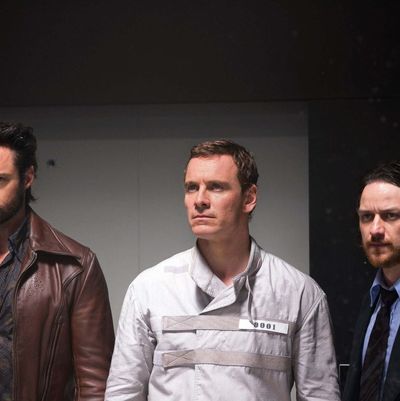
The multi-generational Marvel extravaganza X-Men: Days of Future Past is a triumph of entrepreneurship. Consider the challenge from a business perspective. You have a stellar property — a team of superhero outcasts or “mutants” led by the telepathic Profession Xavier — that is firmly linked to a cast thought (rightly or wrongly) to have reached its sell-by date. A prequel that features new actors representing the characters’ younger selves makes heaps of money but doesn’t supplant the original films in the public imagination. Why not throw in time travel and unite the streams? The gimmick works splendidly enough to make even that clunky pretzeled title sing.
You know the drill: There’s a catastrophic present in which all is lost and the fatal development can be traced back to a single event. The sole hope is to bound back in time and keep said event from happening. You and I can’t, but we’re not superheroes. Faced with the extinction of mutantkind via shape-shifting machines called Sentinels, Xavier (Patrick Stewart) confers with his old friend turned enemy turned friend turned enemy turned friend Magneto (Ian McKellan), and then directs Kitty Pryde (Ellen Page) to grip the temples of Logan/Wolverine (Hugh Jackman) hard enough to send his mind into his body in 1973, the week of the Paris Peace Talks that ended the Vietnam War. Why then? Xavier generates great gobs of exposition that can be condensed as follows: Blue shape-shifter Mystique (Jennifer Lawrence) assassinated a doctor (Peter Dinklage) doing Nazi-like experiments on mutants and thereby pissed off humans, who got hold of her DNA and built Sentinels. So if you stop the assassination, you stop the Sentinels and, not incidentally, encourage Mystique to give up her snotty militant persona and revert to the much more amenable “Raven” — whom Xavier loved with all his heart.
Director Bryan Singer never had the lightest touch, but his Superman Returns was unusually ponderous and sadistic, and his Jack the Giant Slayer lethargic, as if he didn’t care anymore. He’s reborn — deft, elegant, spring-heeled — in X-Men: Days of Future Past. The special effects don’t bog him down: They lift the movie to a surreal and more emotional dimension. The Sentinels come in what look like flying coffins, a poetic expression of doom. And there’s nothing casual about the way in which the human-looking characters transform into their true, mutant selves: It’s triumphant but with a touch of melancholy — confirming that they’ll always be “different.” After Wolverine jumps through the predictable hoops (I’m from the future! It was you who sent me! etc.) and enlists the sad, drug-dependent Xavier (James McAvoy), the duo plus the faster-than-a-speeding-bullet Quicksilver (Evan Peters) slip into the Pentagon to liberate the royally resentful metal-bender Magneto (Michael Fassbender) from his nonmetallic cell — whereupon Singer executes the movie’s show-stopping set-piece, which is like The Matrix’s famous “bullet time” number reconceived as a slow-motion slapstick ballet. Bravo!
This is obviously a hell of a high-priced ensemble, and not all the stars are well used. Halle Berry as Storm sleepwalks through her battle scenes, Page does little besides squat next to Jackman and squinch up her face, and Anna Paquin is virtually invisible (seriously — where in the movie is she?). But the others have their affecting moments. Stewart and McKellen insert the requisite Pinteresque pauses into their elderly reminiscences and flood their exchanges with feeling. McAvoy’s Xavier has gone adorably to seed, and it’s fun to watch him find his inner Patrick Stewart. Fassbender cunningly holds back, putting all his anger in his eyes and wolfish teeth. Jackman is the one who holds the whole ramshackle construction together: His Wolverine now has gravitas. But the jewel of the movie is Jennifer Lawrence. In her human guise, she wears a smile that suggests she has dirty secrets (she does). When she goes blue, she’s even better. She swivels from the waist with robotic precision (she’s an excellent mime), and her eyes evoke the chill fury of a blood-drenched Sissy Spacek incinerating teens in Carrie.
For all the superb work, X-Men: Days of Future Past is still a product: It doesn’t feel as if it has a reason to exist apart from its studio’s determination to preserve a “tentpole.” Even on its own commercial terms, it has lapses, chiefly the climax (featuring Dick Nixon!), in which the X-Men attempt to change history: The whole idea is kind of lame. As I watched, I thought back to more ingenious treatments of the same conceit, several of them featuring Patrick Stewart. There’s a classic Star Trek: The Next Generation episode called “Yesterday’s Enterprise” that’s dark and scary and makes you sad to see how obviously bummed Denise Crosby was to have bailed out on Tasha Yar in the show’s first season for a movie career that never happened. For that matter, TNG’s two-hour finale, “All Good Things …”, had a wittier “unite the streams” construction.
A further damper, I admit, was my extra-cinematic knowledge of Singer’s alleged sexual misdeeds — a scandal that, whatever the legal outcome, has stopped his comeback in its tracks. Once again, viewers will have to struggle to separate the artist from the art. And while Singer’s work is not in the same league as Roman Polanski’s or Woody Allen’s, the X-Men films (in particular, X2) have a potent gay-rights (“Mutant and Proud!”) subtext that I’d hate to see certain segments of the population link to his behavior off-camera. That subtext is the part of Singer’s legacy that soars — like his X-Men — above the mean world.





